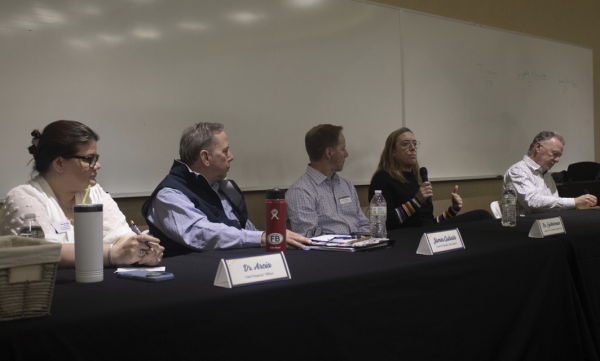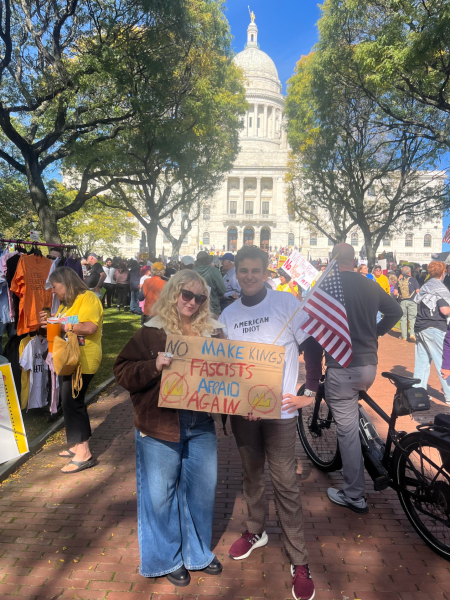Justice Gaines lectures on the wage gap and gender equity
Organized in partnership by the Center for Career & Professional Development and the Intercultural Center, a speaker event titled “Equity in the Workforce” educated students, faculty, and staff on the current state of pay equity and the wage gap. The event was particularly timely considering the fact that it took place on Tuesday, April 10, which happens to be “Equal Pay Day.”
Gabby Porcaro, the coordinator for LGBTQ+ Programs, introduced the speaker of the event, Justice Gaines. Gaines is an activist and poet based in Providence, Rhode Island, and works as an organizer for the Rhode Island Jobs for Justice organization.
Gaines opened up zir speech by posing a question to the audience about what the wage gap is. One member of the audience offered up the amount of money that a woman makes to a man’s dollar, while another person mentioned that he had heard a statistic that wages are lowest for black and Latina women.
“The wage gap is a disparity between wages and enumeration received by white men as compared to their colleagues, primarily women of color,” Gaines said. “Often, we hear it about white women and white men, but the people who lose the most with the wage gap are people of color. It persists within nearly every occupation… and also systematically.”
Gaines explained that the R hode Island Jobs for Justice organization looks at everything through both a gender and racial lens.
“You can’t look at workers’ rights without looking at how women of color are being affected by the policies you’re putting into place,” ze said, adding that this approach requires a holistic lens.
Gaines shared statistics regarding the differences in pay between various genders and races, highlighting both the intersectionality and the hierarchical scale of these identities when it comes to wages.
Gaines made sure to clarify the difference between pay equity and equal pay, explaining that pay equity is “the elimination of sex, gender, and racial discrimination and compensation in wage setting systems.”
“A woman working full-time in Rhode Island makes 86 cents to the dollar made by her male counterpart,” Gaines said. “Black women, however, make 58 cents to the dollar of a white man. Latino women, who are the lowest that we have numbers for, make 51 cents to the dollar of a white man.”
Ze made sure to note that the wage data for indigenous women is unknown, which speaks volumes in and of itself. Ze continued on to explain that, although the data suggests that Asian women’s wages are comparable to those of white women, it must also be noted that there are many southeast Asian women living in Providence whose economic standings are much lower than that of Asian women from other regions of the continent.
Most people in the audience seemed unsurprised by the statistics that proved that women of color are given lower wages. One audience member stated that she feels as though the information is “out there,” and that it has become common knowledge.
When trans women transition, their earnings fall by one-third. On the other hand, trans men’s earnings increase after they transition. This data of the transgender disparity provides clear evidence that gender plays a role in determining wages.
Gaines discussed reasons as to why the wage gap persists, despite the fact that knowledge of its existence is so widespread. Generational wealth, discrimination/prejudice, access to opportunities/education/resources, inability to compare wages/salaries, the Motherhood Penalty, negotiation skills, and gendered/racialized industries are the top reasons ze cites.
“We recognize all those -isms that are out there, we recognize the inequities that happen for people who are on the margins” said Don Mays, the Director of the Intercultural Center.
“We want you to be aware when you get out there that it’s not a problem for someone else. It’s a problem for all of us,” Mays added in a call to action. “If we’re not all addressing the inequities that are happening, then it takes away the humanity of all of us, including yourself.”





